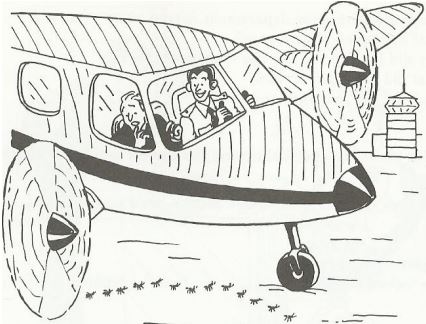
Small like ants
 المؤلف:
L.A Hill
المؤلف:
L.A Hill
 المصدر:
Advanced-Anecdotes in American English
المصدر:
Advanced-Anecdotes in American English
 الجزء والصفحة:
26-1
الجزء والصفحة:
26-1
 17/10/2022
17/10/2022
 1778
1778

Mr. Johnson had never been up in an airplane before and he had read a lot about air accidents, so one day when a friend offered to take him for a ride in his own small plane, Mr. Johnson was very worried about accepting. Finally, however, his friend persuaded him that it was very safe, and Mr. Johnson boarded the plane.
His friend started the engine and began to taxi onto the runway of the airport. Mr. Johnson had heard that the most dangerous parts of a flight were the take-off and the landing, so he was extremely frightened and closed his eyes.
After a minute or two he opened them again, looked out of the window of the plane, and said to his friend, "Look at those people down there. They look as small as ants, don't they?"
"Those are ants," answered his friend. "We're still on the ground."
A Answer these questions:
- Why was Mr. Johnson worried about accepting his friend's offer to ride in his small plane?
- What did Mr. Johnson think were the most dangerous parts of a flight?
- How did he feel when they began to taxi onto the runway, and what did he do?
- What happened after a minute or two?
- What did Mr. Johnson say to his friend?
- And what did the friend answer?
B Which words in the story mean the same as:
1-afraid
2-nervous
3-at last
4-entered
5-coming down
6-shut
7-go(ing) up
8-without danger
C Write the sentence for each picture, choosing the correct word under each blank space.

1. Mr. Johnson has (missed) (spared) ________ his plane!

2. Mr. Johnson wants to borrow his friend's car, but the friend can't (miss) (spare) _________ it today.

3. Mr. Johnson is (crossing) (passing) ________a bridge.

4. He is (crossing) (passing) _______ another bridge now.

5. Mr. Johnson doesn't have a car today, so he'll just have to (borrow) (lend) _________ one.

6. His neighbor owns two cars. He can (borrow) (lend) ________ one to Mr. Johnson.
 الاكثر قراءة في Advanced
الاكثر قراءة في Advanced
 اخر الاخبار
اخر الاخبار
اخبار العتبة العباسية المقدسة


